MLC: Dialogue with the Bashu Symbols – Uncovering a Journey with Millennium-Old Culture
澳門大學馬萬祺羅柏心書院: 與巴蜀符號對話 - 千年文脈的解密之旅
為增進川澳兩地青年一代的友誼和對祖國西部的瞭解,馬萬祺羅柏心書院副院長馮家維于2024年5月27日至6月3日聯同八位馬萬祺羅柏心書院院生赴四川參加 “文化記憶之旅-巴蜀符號探秘”研習營。此次活動由中國教育部“港澳與內地大中小學師生交流計劃”(萬人計畫)資助四川大學、香港理工大學、香港大學和澳門大學合辦,旨在通過主題研討、參觀走訪、體驗學習等方式增強港澳青年對巴蜀文化在中國歷史的重要地位和獨特之處的瞭解。此次活動獲得澳門大學校長宋永華教授、副校長(全球事務)馬許願教授和副校長(學生事務)莫啓明教授的大力支持和指導,並在全球事務總監王瑞兵教授的協助下成功舉行。
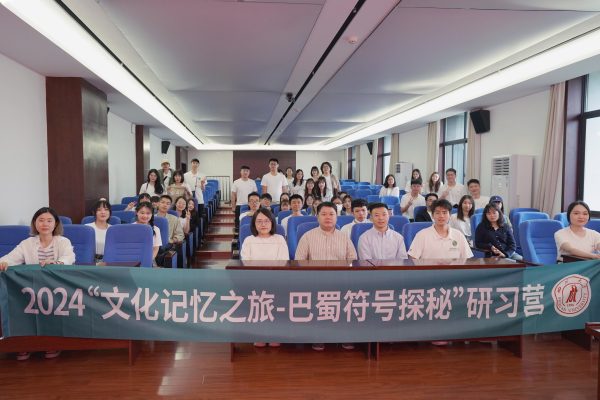
四川大學文學與新聞學院副院長羅鷺教授(左三)、副教授袁喆(左二)與馬萬祺羅柏心書院副院長馮家維(右三)參加開營儀式
這場旅行讓學子們跨越了1300百多公里,從澳門半島抵達富庶豐饒的成都平原,引領他們目睹了承載著三千餘年悠久歷史的巴蜀文明與富麗繁華的西南地區現代都市之首如何融合與共存。當澳門大學遇上四川大學,當粵語遇上四川話,當廣東胃遇上麻辣鮮香的川菜,又會碰撞出什麼樣的火花呢?
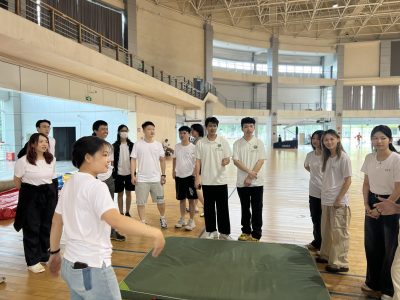
破冰活動
對於四川大學這一所享譽盛名的巍巍學府他們已早有耳聞,校園花木繁茂,碧草如茵,具有”海納百川,有容乃大”的人文底蘊。激動人心的旅程在四川大學的江安校區拉開帷幕。開營儀式上四川大學文學與新聞學院副院長羅鷺教授致辭之後,他們聆聽了三場講座,分別是張耕教授主講的”方言與中國文化”,王濤教授主講的”試看漢字的語意高維性”,劉郝霞教授主講的”敦煌遺書庋藏地點、編號的秘密”,讓他們對四川的文化有進一步的了解。
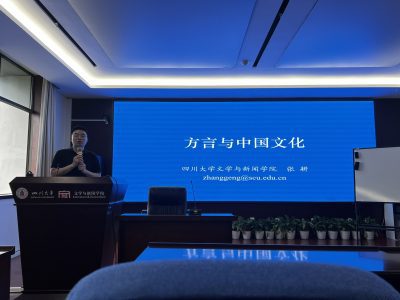 |
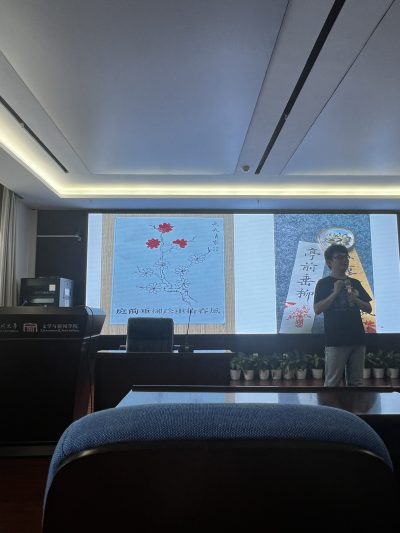 |
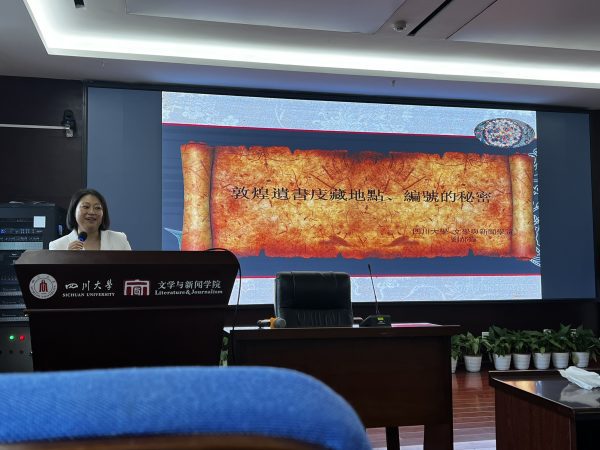
張耕老師、王濤老師與劉郝霞老師的精彩講座
讀萬卷書,行萬里路。在四川大學望江校區的博物館探究川西平原古今風貌,於三星堆豐富館藏中一窺古蜀文明起源,漫步古樸雅緻的杜甫草堂,攀登高聳入雲的峨眉山,舟行於樂山大佛的周圍,穿梭於五光十色的太古里商業街,流連於錦里古鎮的煙火氣息,驚嘆於獨自一格的城市魅力。
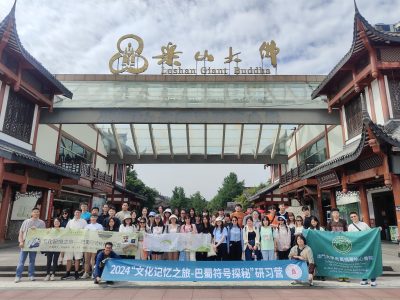 |
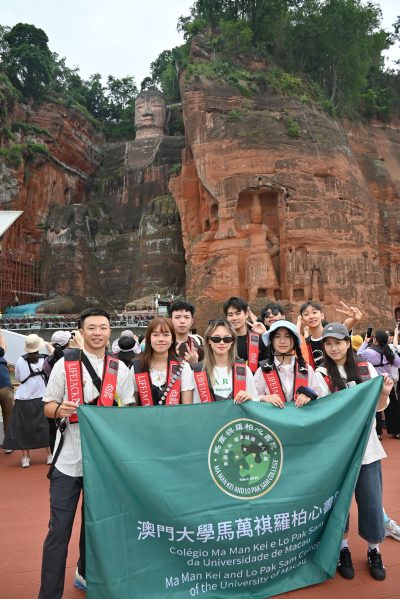 |
三地學子在樂山大佛前合影留念
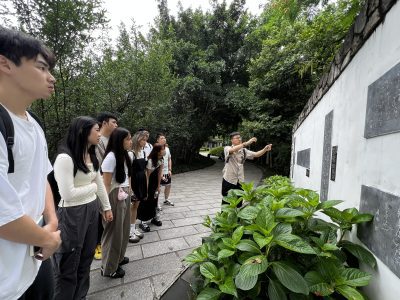
滕勝霖老師在杜甫草堂為同學講解拓片制作方法
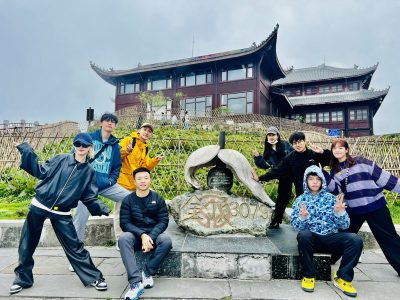
在峨眉山登頂後合影留念
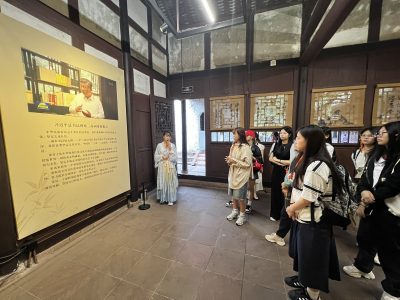
在三蘇祠深入了解宋代文人蘇軾、蘇轍和蘇洵的生平事跡
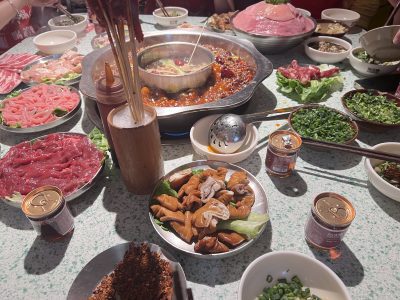 |
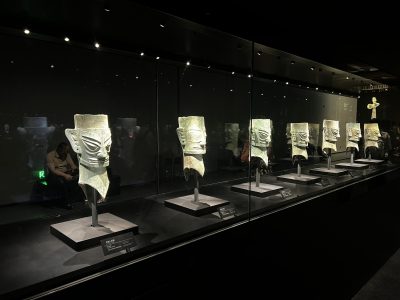 |
||
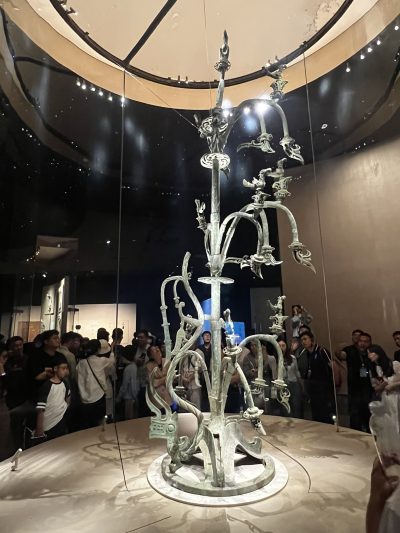 |
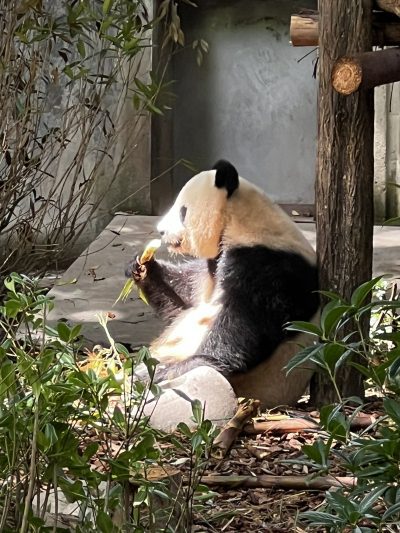 |
||
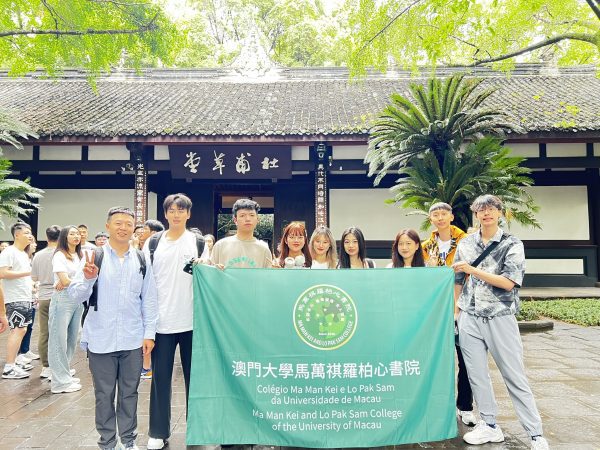 |
|||
三地學子的旅程,是互相包容,互相扶持。有美食一起分享,有風景一起影像。他們是一個團隊,也是一群朋友,更像是一個大家庭。他們在一起的路途並不辛苦,因為笑聲會沖淡一切煩惱,讓疲憊的身體得到解放,讓疲憊的眼睛因為驚喜而閃閃發光,同學們收穫了珍貴的友情。在這裡,他們學習歷史文化知識,不斷充實頭腦,豐盈內心。在這裡,中華傳統文化與五千年文明歷史讓他們心旌蕩漾,倍感自豪。在這裡,他們牢記師長的諄諄教誨,不忘志願者們的滴滴汗水,收穫心靈的累累碩果。成都的愜意生活與豐富文化,在他們眼裡如同一首詩,陶冶他們的性情;如同一眼清泉,洗滌他們的心靈。文化記憶之旅,不僅是一個尋根溯源的故事,更是他們成長的階梯。
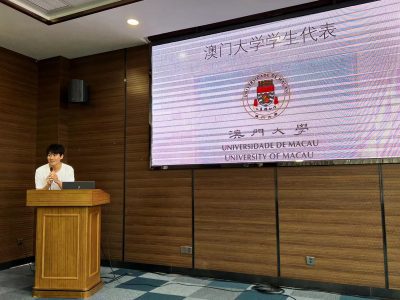
學生領袖徐偉健在結營式代表澳大學生致詞
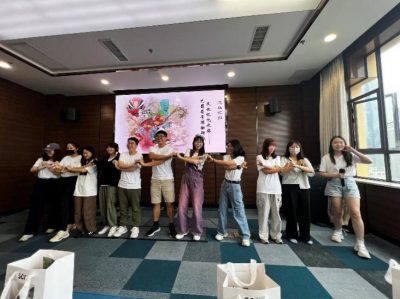 |
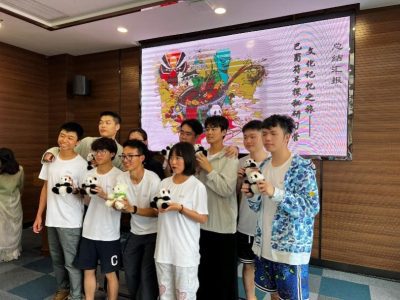 |
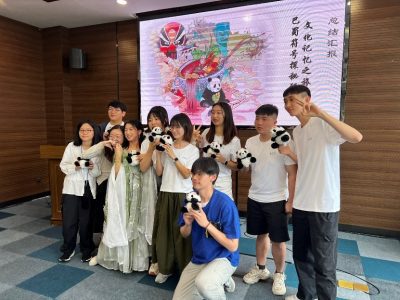 |
結營式
書院在此特別感謝袁喆、滕勝霖和陳秋韵老師的帶領和每一位同學的幫助。沒有工作人員們辛勤的付出,也就沒有研習活動的順利進行與巨大成功。
團員感想:
關澤超: 我在這七天的文化之旅之中有著許多的收穫,我認識了來自各所學校的同學老師,收穫了很多友誼和難忘的回憶;也在這幾天之中,我領略到了巴蜀文化和佛文化的浩瀚,對中華文化有了不再是局限於課本中的新的認識和了解,產生了更深厚的文化自信,我覺得這才是這文化之旅的意義與核心。
陳善晴: 在這八天的行程裡面,我了解到更多關於巴蜀文化的歷史,去了參觀很多不同的地方都讓我的文學素養有了顯著的提升。還有看了四川成都很有名的大熊貓基地,親眼近距離的看到了小熊貓和大熊貓,與在澳門路環的大熊貓館看熊貓是兩種截然不同的體驗。
李志誠: 八天的四川研學之旅讓我收穫很多寶貴的東西。我還在本次旅行與港大、港理大和東道主四川大學的同學老師們作交流,我們快地跟不同學校的同學們打成一片,成為很好的朋友。
【文: 陶兆妤 】
To foster stronger connections between students of Sichuan, Macau and Hong Kong and deepen their understanding of China, Dr. Gary Fung, Associate Master of Ma Man Kei and Lo Pak College (MLC), led eight students to join the “Cultural Memory Journey – Exploring the Bashu Symbols” study camp in Sichuan from May 27 to June 3, 2024. This event was co-organized by Sichuan University, Hong Kong Polytechnic University, University of Hong Kong, and University of Macau. The study camp is under the “Ten Thousand People’s Scheme” and was sponsored by the Ministry of Education of China. The aim was to strengthen the understanding of Hong Kong and Macau youth about the important position and uniqueness of Bashu culture in Chinese history through discussions, site visits, and experiential learning activities. The event received support and guidance from Prof. Yonghua SONG, Rector of University of Macau, Prof. Rui Paulo da Silva MARTINS, Vice Rector (Global Affairs), and Prof. Kai Meng MOK, Vice Rector (Student Affairs) and was facilitated by the Director of Global Affairs Office, Prof. Wang Ruibing.
The journey took the students over 1,300 kilometers, from the Macao to the fertile Chengdu Plain, allowing them to witness how the Bashu civilization with over 3,000 years of history blends and coexists with the prosperous and modern southwestern urban center. What kind of sparks would be ignited when Cantonese met Sichuanese, when Guangdong delicate appetite met the numbing and fragrant Sichuan cuisine?
The students had long heard of the renowned Sichuan University motto of “Sea, all water, receives all rivers; Utmost wit listens to all sides”. The exciting journey began at the Jiangan campus of Sichuan University. After the opening ceremony speech by Prof. Luo LU, the Associate Dean of the College of Literature and Journalism, they listened to three captivating lectures: “Dialects and Chinese Culture” by Dr. Zhang Geng, “Exploring the High-Dimensional Semantics of Chinese Characters” by Dr. Wang Tao, and “The Secrets of the Dunhuang Manuscripts’ Storage Locations and Numbering” by Dr. Liu Haoxia, which further deepened their understanding of Sichuan’s culture.
As a common saying goes, “Travelling brings about far greater benefit than mere book learning”, at the Sichuan University Museum, they explored the ancient and modern landscapes of the Chengdu Plain; at the Sanxingdui Museum, they caught a glimpse of the origins of the ancient Shu civilization; they strolled through the elegant and ancient Du Fu Thatched Cottage, climbed the majestic Mount Emei, sailed around the Leshan Giant Buddha, wandered through the vibrant Taikoo Li commercial street, and lingered in the atmospheric Jinli Ancient Town, marveling at the unique charms of the city.
The students from three different regions shared delicious food, captured beautiful scenery together. They were a team, a group of friends, and a big family. Their journey was filled with laughter and delightful memories. Not only did the students gained precious friendships, they also learned traditional Chinese culture and the 5,000-year civilization that shaped the modern China. The leisurely life and rich culture of Chengdu were like a poem in their eyes, like a clear spring, cleansing their souls. This cultural memory journey was not only a story of tracing their roots, but also a staircase of their growth.
The college would like to express its special thanks to Prof. Yuan Zhe, Dr.Teng Shenglin, and Ms. Chen Qiuyun, and the student volunteers for their assistance. Without the hard work of the staff, the camp could not have been carried out so smoothly and successfully.
Student Reflections:
Guan Zechao: In this 7-day cultural journey, I gained a lot and met students and teachers from various universities, and have made many friendships and unforgettable memories. During these few days, I gained a deeper understanding and appreciation of the vast Bashu culture and Buddhist culture, which went beyond from what I had learned from textbooks. This has strengthened my cultural confidence, and I believe this is the true meaning and core of this cultural journey.
Chan Sin Cheng: In this 8-day itinerary, I gained a deeper understanding of the history of Bashu culture by visiting many different places, which has significantly enhanced my knowledge. I also visited the famous Chengdu Giant Panda Base, and had the opportunity to see the giant pandas and baby pandas up close, which was a completely different experience from seeing them at the Giant Panda Pavilion in Macau.
Lei Chi Seng: The 8-day trip to Sichuan has allowed me to gain many valuable things. During this trip, I also had the opportunity to exchange with students and teachers from the University of Hong Kong, Hong Kong Polytechnic University, and Sichuan University. We quickly bonded with students from different schools and became good friends.